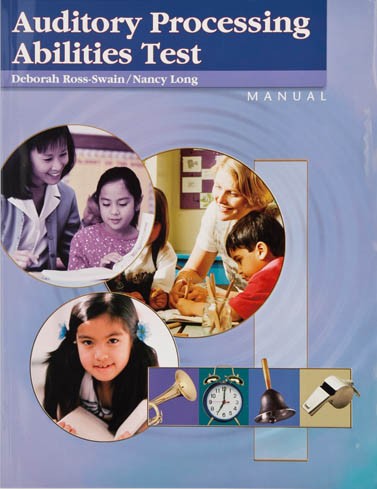Auditory Processing Abilities Test (APAT)
Complete Kit
- Ages 5 through 12 years
- Testing Time 45 minutes or less
- Administration Individual
-
Product Code 8353-6 ( MR #031564 )
* Qualifications required to purchase this item. Click here to complete the qualifications form.
Price $140.00
Contents
The APAT is a nationally standardized, norm-referenced auditory processing battery for use with children ages 5-0 through 12-11. It may be used for the following purposes: the identification of children who are at risk or who may be experiencing Auditory Processing Disorder (APD); to determine a child's specific strengths and weaknesses among a number of auditory processing skills; document a child's improvement in auditory processing skill abilities as a result of therapeutic interventions. The APAT was developed using a model based on a hierarchy of auditory processing skills that are basic to listening and processing spoken language. These skills range from sensation to memory to cohesion.
The APAT is comprised of 10 subtests that quantify a child's performance in various areas of auditory processing:
•Phonemic Awareness
•Word Sequences
•Semantic Relationships
•Sentence Memory
•Cued Recall
•Content Memory
•Complex Sentences
•Sentence Absurdities
•Following Directions
•Passage Comprehension
The APAT provides composite index scores as well as individual subtest scores: Global Index reflecting overall auditory processing efficiency, Linguistic Processing Index, and Auditory Memory Index. Optional analyses allow further examination of Linguistic Processing tasks (yielding indices for discrimination, sequencing, and cohesion) and Memory tasks (yielding indices for immediate recall, delayed recall, sequential recall, and cued recall).
The battery is designed primarily to be used by speech-language pathologists but may also be used by other professionals such as learning disabilitities specialists, psychologists, and resource specialists.
Reliability and Validity
Internal consistency measures are relatively high: across all ages, Cronbach's Coefficient Alpha for subtest items ranges from 0.70 to 0.89; Spearman-Brown Correlations range from 0.75 to 0.93. Subtest SEMs are relatively low, ranging from 0.79 to 1.51 across all ages. Criterion-related validity coefficients are moderately high; the correlation between subtest scores from APAT Phonemic Awareness and LAC-II is 0.54, while the correlation between percentile ranking of APAT Total and LAC Total is 0.53. (Because the LAC provides only composite scores that assess a number of skills and APAT individual subtest scores reflect discrete skills, correlations are lower than if one were comparing two discrete sets of similar skills.)
Administration and Scoring
The APAT is individually administered and can be completed and scored in less than 45 minutes. It yields scaled scores and percentile ranks for subtests and standard scores and percentile ranks for the composites. Age equivalents are also available for all areas assessed.

 Proud to be Canadian
Proud to be Canadian

